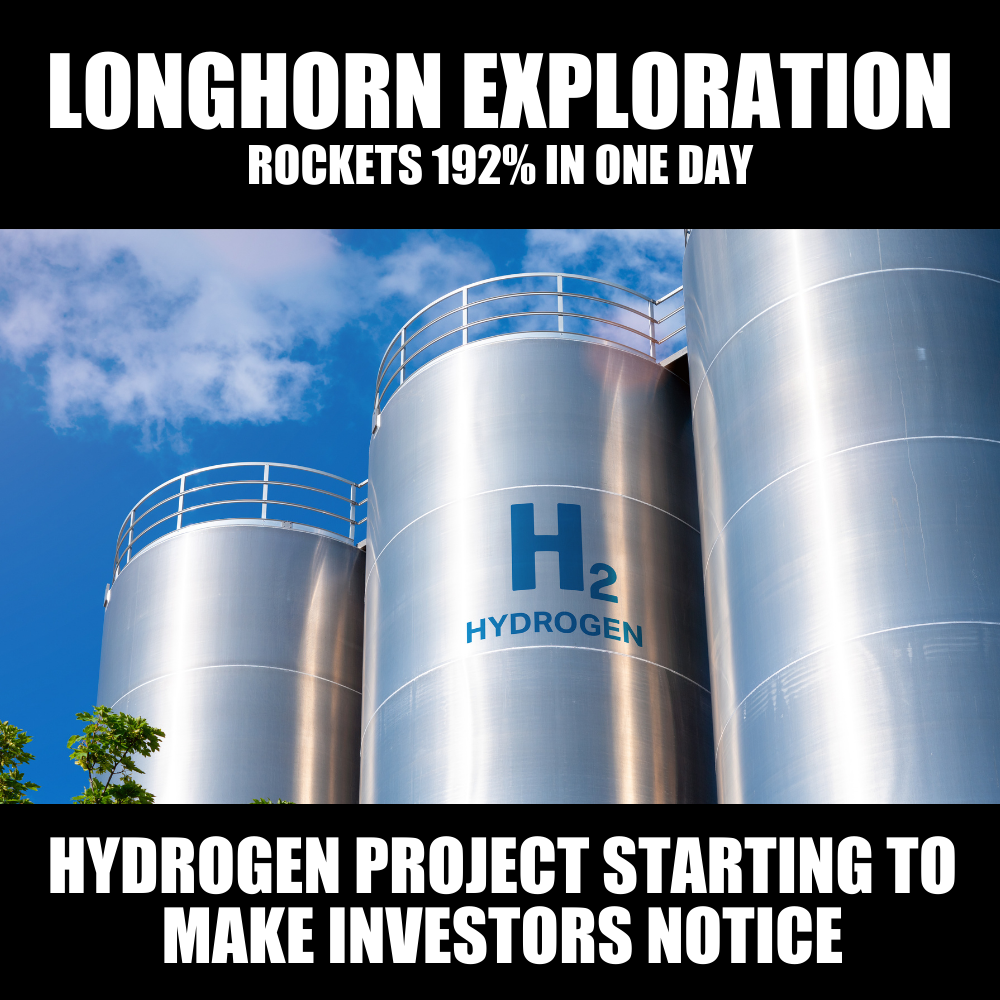I’ll bet you a shiny new banana you don’t know who Longhorn Exploration (LEX.V) is.
That’s not on you – nobody knew who this resource explorer was yesterday. But today is another story, after the $1 million market cap junior jumped 192% in Wednesday trading.
Rare are the times one can come in after a one-day triple and still get in on a deal valued under $4 million, but this be one of those times.
Who is Longhorn and why did it run? Let’s break that down in today’s “WTF Just Happened?”
Layman’s Terms Summary and Analysis of Longhorn’s Long Jump:
What Happened?
- Longhorn Exploration Corp. has signed an agreement with PureWave Hydrogen Corp. to potentially acquire rights to explore and produce natural hydrogen from a parcel of land in Kansas, USA.
What is ‘Natural Hydrogen’?
- Natural hydrogen (also called white or geological hydrogen) is a clean energy source found underground. It’s unique because, when used, it only produces heat and water, making it very environmentally friendly.
- It’s the cleanest fuel available, especially for things like long haul trucking, where fossil fuels are heavy polluting and batteries have to be way too large and heavy to be feasible.
- Using natural hydrogen can significantly reduce the carbon footprint of energy production.
- Natural hydrogen is considered a potential game-changer in the energy industry, especially when sourced locally.
Other types of hydrogen are less desirable, including:
- Grey Hydrogen: Produced from natural gas through a process called steam methane reforming. This method emits significant amounts of CO₂.
- Blue Hydrogen: Also produced from natural gas but includes carbon capture and storage (CCS) to reduce emissions.
- Green Hydrogen: Produced by electrolysis of water using renewable energy sources like wind or solar power, making it very clean but energy-intensive.
Who are PureWave Hydrogen Corp.?
- This Colorado-based company focuses on finding and developing natural hydrogen sources in North America, using advanced technology to locate high-potential hydrogen deposits.
- PureWave has leases with Kansas landowners to explore and produce hydrogen.
- Longhorn now has the option to take over these leases by paying money and issuing shares to PureWave, as well as investing in the project.
Payment and Investment Schedule
- To get the property, Longhorn must pay PureWave $300,000 in stages over three years., which is very manageable.
- They also need to issue a total of two million shares to PureWave over the same period, worth roughly $200k a few days ago, but $600k today. Good deal for PureWave, without too much harm to Longhorn.
- Additionally, Longhorn must spend at least $3 million on work related to the properties over three years, which is, again, very reasonable.
- Some directors from PureWave will join Longhorn’s board as part of the deal, bringing advanced sector knowledge to the company.
- Longhorn raised almost $900k through a private placement to fund the project at $0.10 per share. Those who bought in on that raise are VERY in the money right away.
Tell me about the property:
- Location and Size: The Lily Rock Project covers approximately 519.7 net acres of land in Kansas, USA, specifically in Riley, Geary, and Morris counties.
- Hydrogen System: The project leverages the presence of iron-rich mafic formations, meteoric groundwater circulation, and adequate seals to potentially trap and hold commercial quantities of hydrogen.
- Geologic Structures: The region features significant structural formations, including the Nemaha Ridge, a prominent basement structural high, and the Mid-Continent Rift Zone, which includes mafic intrusives and thick mafic sequences conducive to hydrogen generation.
- Resource Estimates: The prospective hydrogen resources have been evaluated using probabilistic methods. Gross prospective hydrogen resources range from a low case of 55 MMscf to a high case of 2,222 MMscf.
- Prospective Hydrogen Resources: The net unrisked prospective hydrogen resources range from approximately 113,849 kg (P90) to 4,610,874 kg (P10).
- Development Stage: The project is at an early exploration stage, with no current commercial hydrogen fields in operation. The assessment focuses on the potential for commercial viability if sufficient hydrogen is discovered and extracted.
How does a hydrogen project move to production?
- Exploration and Leasing (done by PureWave)
- Secure leases and permissions to explore land for natural hydrogen deposits.
- Use advanced geospatial and analytical tools to identify potential sites.
- Acquisition and Investment (done by Longhorn)
- Partner with or acquire companies with existing leases and expertise (like Longhorn did with PureWave).
- Raise necessary funds through private placements or other financing methods.
- Development and Drilling (up next)
- Conduct detailed geological surveys and drilling operations to access hydrogen reserves.
- Ensure continuous operation to extend lease terms and begin production.
- Production and Commercialization
- Set up infrastructure for extraction, storage, and transportation of hydrogen.
- Develop partnerships with industries and governments to market and sell hydrogen as a clean energy source.
- Sustainability and Innovation
- Focus on sustainable extraction methods.
- Invest in research and development to improve extraction and utilization technologies.
So that’s what’s up.
To be clear, exploration of any resource is risky, and this one is no exception. I don’t have a horse in the race, but there’s clearly a r3alization out there that, for all electric vehicles have done for city passenger transport, the size of battery needed for EV long haulage is way too big to be economic. That’s why interested parties are increasingly looking to hydrogen power as an alternative, and natural hydrogen is not in plentiful supply, so there might be a bit of meat on these bones.
Watchlist.
— Chris Parry
FULL DISCLOSURE: Not a client company, no commercial interest.

